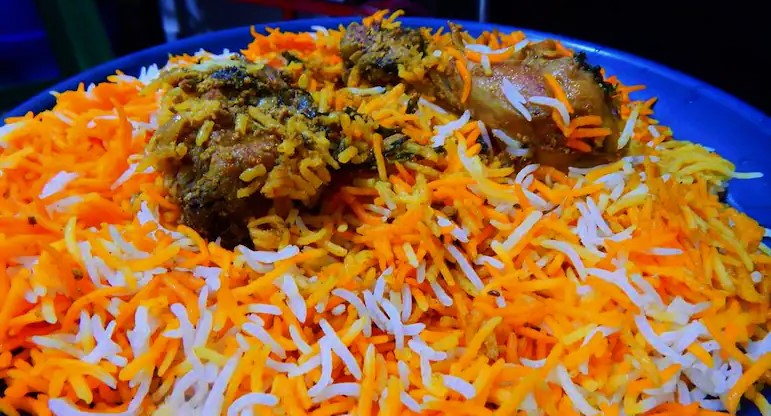
Abu Saleem’s biryani brought Abu as much fame as our small town could possibly offer. He had been making that biryani for around five decades. A decade longer than my current age. Even after five decades, the recipe was unbeatable. Nothing tasted like his biryani. Not even the biryani that his own kids made in that ancient, 50-year-old shop that had never once been renovated, next to Saleem’s house that had once been a hut.
The first memory of most people is a visual one. Most can remember a scene from their childhood better than a sound or a smell. But my oldest and most vivid memory starts with a smell. The smell of spices, chicken, butter, and something more. Some untraceable bits that lingered in Saleem’s biryani and his shop. We would eat at least twice a week at Saleem’s like any other sensible non-vegetarian of our town. One day while trying to understand the secret of that untraceable smell, I ventured into the kitchen. Everything inside the kitchen was exactly everything that would go into the making of a biryani. But that smell. I couldn’t find the reason for that unfathomable smell. Saleem saw me peeking from afar and called out to me. I was a curious child with a mystery to solve. Besides my regular, formal salaam, I awkwardly ventured into an informal hug. And then the mystery resolved itself. Or perhaps, deepened. Because Abu smelled just like the biryani he made. That night, back home after the biryani, I wondered if Abu smelled like his biryanis or if his biryanis smelled like him.
Once, when I was small, we went there for two Saleem Specials, and my father made the mistake of mocking Saleem for his kanjoosi at never having renovated the shop that brought him so much money and fame. Saleem replied, smiling toothlessly, that the smell remains the same, so the shop remains the same. My father pestered him some more till Saleem excused himself to the kitchen. The biryani was spicier that day.
Some said that Saleem put afeem (opium) in his biryani. Rumour or not, all of our townsfolk had, at some point in their lives, believed it. Once, after getting into a verbal spat with Saleem’s son, my father announced confidently that he had heard from a villager that another villager had seen Saleem pour afeem in the biryani, and that from then on we were to eat at Kareem’s instead. For two whole weeks, we had to make peace with Kareem Korma Chicken Special. Kareem had set up shop next to Saleem when he saw Saleem’s business booming. Biryani at Kareem’s wasn’t bad, but everyone knew that one only came there when the wait at Saleem’s was impatiently long. So sitting at Kareem’s restaurant and eating his biryani, we would all glance over at Saleem’s small shop. Even Kareem’s smelled more like Saleem’s biryani than of his own. Such was that smell that it aroused hunger even after a full stomach’s worth of dinner at Kareem’s. Two weeks into the Kareem biryanis, I couldn’t bear it anymore. Even my father said once, sitting at Kareem’s, that he would forgive Saleem’s son if he apologizes. The next time we went to Kareem’s, I went into the washroom, wet my hair, plucked out a few strands, and keeping them in my mouth, made my way to our table. Then, as the food arrived, I took a bite before anyone else and spat it out loudly and quickly in the centre of the table, with all its plates and cutlery. Everyone looked at the hairy biryani. We skipped dinner that night. No one had any appetite afterward.
Next day, when my Dad came back from work, he announced that he had run into Saleem when he was around his shop and he had asked where we had been. When my father told him about the spat with his son, Saleem had replied, oh but an argument is no reason to miss out on good biryani, and had laughed toothlessly. The afeem in Saleem’s biryani must have been a rumor spread by one of Kareem’s. My father added, laughing, that the afeemi biryani tasted better than the hairy biryani and scratched my hair lovingly.
Years went by, as they have a way of doing, and Saleem kept his biryanis the way they had always been. We lived our mundane lives in the day and looked to the nights for Saleemi biryanis. That’s how our townsfolk lived for decades. I lived that life just like them until one day I had to part from it and head to the city for a supposedly better living. There I grew older, got married, had kids, the black hair whitened, then eventually fell as my parents had in the previous decade. Then one day my son asked me Dad what your town was like? and no image came to me, only a smell and I wished for a return. I told my son that maybe he would see for himself what it smells like. The next weekend we took a train to a small town I once called home. The train journey was faster and more convenient than I last remembered. So were the roads. There were proper roads now instead of the dirt pits. The sky was a fainter shade of blue. People, a little colder. Everyone I knew there was either gone, dead or dying. Where my house once stood, there now stood a flat. Everywhere I saw nothing that could say that this was the place I had once called home. Malls and complexes stood in the centre of the town. Advertisements of brands that I saw in the city; I saw them here too. We kept moving, my son and I, just like the advertisement pamphlets moved around us in the wind; aimlessly. Until we were spotted by someone. It was a man whose name I tried to remember but failed to. His appearance was different from the picture of the past that had stayed in my head all these years. My son, meanwhile, had found his interest in what seemed like one of those commercial Mughlai restaurants. He asked me for money, which I gave him while I approached the man who seemed to have recognized me. He called me by my name and I neared him with hesitation as he said, Janab, you came to us every day and now you don’t recognize us? I looked at where I was and where he was. The board behind him was tarnished, tattered and torn apart, but thinly visible was still the name—Saleems’s. The man whom I had failed to recognize but who had recognized me was Saleem’s son.
We began to talk. Saleem’s son talked about the business being slow and the town being faster. He was as nostalgic as a man coming from a shop that had been the same for 50 years could be.
Won’t you see him? Saleem’s son asked.
I am in a hurry. I have to go. I said and left, leaving the smell of my childhood hanging by the door and went over to the oldest of Kareems’s chain of restaurants, where my son had ordered the Kareem Korma Chicken Special. I went to the washroom, sighed, and brought my hand over my head. There were hardly any left, but even they would have to be martyred. So I plucked a few strands, and keeping them in my mouth, I made my way to the table.
Sarthak has majored in Literature from Hindu College, University of Delhi and finds honesty as the most important parameter of judging a person or a person’s work. He tries to imbibe the same in his persona and stories. He also finds third-person bios dishonest and pretentious.









Leave a Reply